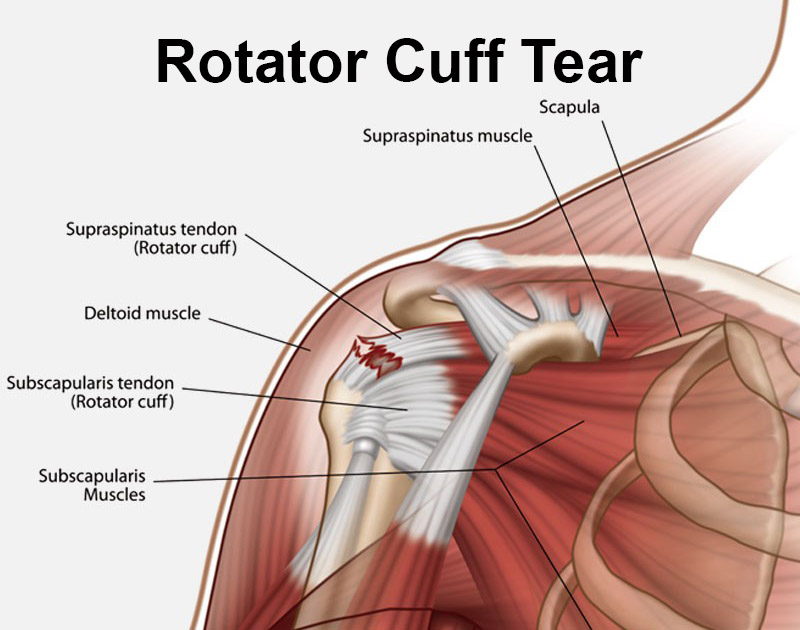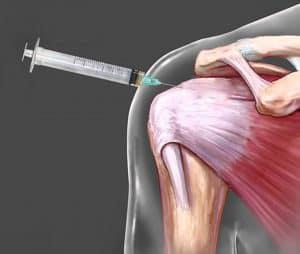Rotator cuff injuries are common among people of all ages and can cause significant pain and disability. The rotator cuff is a group of muscles and tendons that attach the shoulder blade to the upper arm bone, allowing for shoulder movement and stability. Rotator cuff tears can occur suddenly from a sports injury or gradually over time due to wear and tear. Traditional treatments for rotator cuff tears include non-surgical methods like physical therapy or surgical repair. However, advancements in regenerative medicine have provided new non-surgical treatment options for rotator cuff tears.
Regenerative medicine is a medical field that involves the use of biological materials and cells to repair or replace damaged tissues. This approach offers a more natural way of healing the body by promoting tissue regeneration and reducing inflammation. In this blog post, we will discuss how regenerative medicine helps with a rotator cuff tear and how it can be an effective alternative to traditional treatment methods.
What is a Rotator Cuff Tear?
Before diving into how regenerative medicine helps with a rotator cuff tear, let’s first understand what a rotator cuff tear is, its causes, and its symptoms.
Anatomy of the Rotator Cuff:
The rotator cuff is a group of four muscles that control the movement and stability of the shoulder. These muscles include the supraspinatus, infraspinatus, teres minor, and subscapularis. They work together to keep the ball and socket joint of the shoulder in place and to rotate the arm.

Causes of Rotator Cuff Tear:
Rotator cuff tears can occur in different ways, including:
- Traumatic injury: A fall or other accident can cause a sudden tear in the rotator cuff.
- Degeneration: Rotator cuff tears can develop over time due to repetitive overhead movements, wear and tear, or aging.
- Overuse: Athletes or people with jobs that require repetitive overhead arm movements, such as painters or carpenters, are at risk of developing a rotator cuff tear.
Symptoms:
The symptoms of a rotator cuff tear may vary depending on the severity of the tear, but they often include:
- Pain in the shoulder that worsens with overhead activities
- Weakness in the arm
- Limited range of motion
- Difficulty sleeping on the affected side
- Cracking or popping sounds when moving the shoulder
What Are The Warning Signs of a Rotator Cuff Tear?
There are some symptoms or feelings that you may come across that could signify a torn rotator cuff:
- Be described as a dull ache deep in the shoulder
- Disturb sleep
- Make it difficult to comb your hair or reach behind your back
- Be accompanied by arm weakness
It is important to note that you may not have any of the above symptoms and still have a rotator cuff tear!
Can a Torn Rotator Cuff Heal on Its Own?
Without actively making an effort, rotator cuff tears do not have the ability to heal on their own. Nevertheless, non-surgical treatments and surgical options exist to increase the likelihood of getting the maximum recovery and pain relief. The existence of a tear does not automatically require surgery, and it has been observed that around 80% of individuals with partial tears experience improvement through nonsurgical treatments. However, recovery can be a lengthy process that can take up to a year to show progress.
What Are the Treatment Options For a Rotator Cuff Tear?
The treatment options for rotator cuff tears may vary depending on the severity of the injury. Non-surgical methods like physical therapy or rest can be effective for mild or partial tears. However, surgical repair is often necessary for complete tears or severe injuries.
Non-surgical treatments:
Non-surgical treatments for rotator cuff tears may include:
- Rest and avoiding activities that cause pain
- Physical therapy to improve range of motion and strength
- Pain management through medication or injection therapy
- Lifestyle changes to reduce inflammation, such as a healthy diet and regular exercise
Rotator Cuff Surgery:
Surgical repair of the rotator cuff may be necessary for severe or complete tears. The type of surgery performed will depend on the location and size of the tear. Common types of rotator cuff surgery include:
- Open surgery: A large incision is made in the shoulder, and the torn tendon is repaired.
- Arthroscopic surgery: A small incision is made, and a camera and surgical tools are used to repair the torn tendon.
Risks and Complications of Rotator Cuff Surgery:
Rotator cuff surgery is a common procedure, but it carries some risks and complications, including:
- Infection
- Blood clots
- Nerve damage
- Stiffness or loss of motion
- Failure to heal or re-tear of the rotator cuff

Regenerative Medicine for Rotator Cuff Tear
Regenerative medicine is a rapidly evolving field that offers new treatment options for a variety of medical conditions, including rotator cuff tears. This approach involves using the body’s own natural healing processes to regenerate damaged tissues and reduce inflammation. The following are some of the regenerative medicine treatments that can help with rotator cuff tear:
Platelet-rich Plasma (PRP) Therapy:
PRP therapy involves using the patient’s own blood to create a concentrate of platelets, which contain growth factors that promote tissue healing and regeneration. The PRP solution is injected directly into the damaged area, where it stimulates the body’s natural healing processes.
Several studies have shown the effectiveness of PRP therapy in treating rotator cuff tears. In a randomized controlled trial, patients who received PRP injections showed significant improvements in pain and function compared to those who received a placebo. Another study showed that PRP therapy was effective in reducing pain and improving shoulder function in patients with rotator cuff tears.
Stem Cell Therapy:
Stem cell therapy involves using stem cells to regenerate damaged tissues. These cells have the ability to differentiate into various types of cells, including muscle and tendon cells. Stem cells can be obtained from various sources, including bone marrow, fat tissue, and umbilical cord blood.
Several studies have shown promising results for stem cell therapy in treating rotator cuff tears. In a study of 20 patients with rotator cuff tears, those who received a single injection of bone marrow-derived stem cells showed significant improvements in pain, function, and range of motion compared to those who received a placebo injection. Another study showed that adipose-derived stem cell therapy was effective in improving rotator cuff healing and reducing inflammation in animal models.
Prolotherapy:
Prolotherapy is another regenerative medicine treatment that has been used for rotator cuff tears. This treatment involves injecting a solution of dextrose and other substances into the damaged area, which stimulates the body’s natural healing processes and promotes tissue regeneration. Prolotherapy is considered a safe and minimally invasive treatment option, with few side effects reported. However, it is important to discuss this treatment option with your doctor to determine if it is appropriate for your individual needs.
Benefits of Regenerative Medicine
Regenerative medicine treatments offer several benefits for rotator cuff tear patients, including:
- Non-invasive:
- Natural
- Customized
- Effective
- Long Lasting
In Conclusion
Rotator cuff tears can cause significant pain and disability, and traditional treatments like physical therapy or surgery may not always be effective. Regenerative medicine offers new treatment options for rotator cuff tears, using the body’s own natural healing processes to promote tissue regeneration and reduce inflammation.
PRP therapy, stem cell therapy, and prolotherapy are among the regenerative medicine treatments that can help with rotator cuff tears. These treatments offer several benefits, including non-invasiveness, natural healing, customization, effectiveness, and long-lasting results.
If you are suffering from a rotator cuff tear and are looking for an alternative to surgery or physical therapy, consider regenerative medicine treatments. Talk to your doctor about whether these treatments are right for you and start your journey towards healing and recovery.
Learn More About Alternative Ways to Alleviate Your Pain
Get back to doing the things you love, faster & without surgery.
Request an Appointment Today!